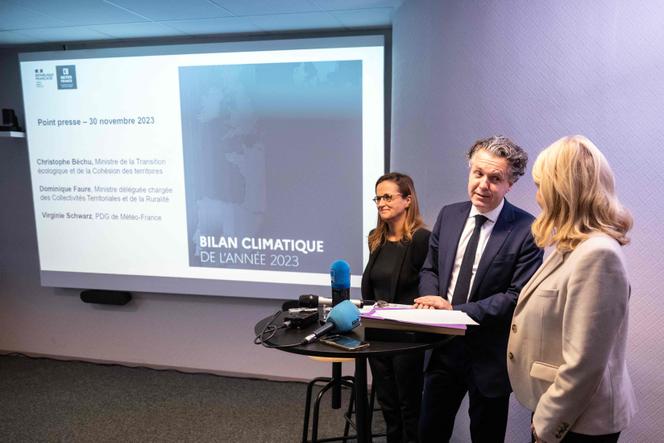


In the field of meteorology, records continue to be broken. Météo-France confirmed in its annual report presented on Thursday, November 30, that 2023 ranks as the second hottest year in France since the start of the 20th century, following 2022, with an average temperature of 14.2°C nationwide. "The thermal anomaly for the year as a whole is expected to be around +1.3°C compared with 1991-2000 normals," wrote the public agency.
The presentation of this report, one month before the end of the year – as was the case in 2022 – took place on the opening day of COP28 in Dubai, United Arab Emirates, and also on the day that Christophe Béchu, the French Ecological Transition and Territorial Cohesion Minister, arrived at the institution's headquarters in Toulouse to launch the Occitanie (south) region's territorial COP. According to Matthieu Sorel, a climatologist in charge of the assessments, "as far as temperatures are concerned, we are certain of the diagnosis, barring exceptionally hot or cold temperatures in December, which should not be the case." This report, which will be consolidated at the end of the year, is based on meteorological data as of November 24.
The autumn of 2023 will also be the hottest on record, surpassing previous highs before 2006 and 2020. Summer "lasted until mid-October, with remarkably high temperatures for the season," observed Météo-France. Virginie Schwarz, the meteorological service's CEO, emphasized the importance of this "longest and most intense heat wave ever observed." "The three hottest years since 1900 were after 2020. And this year, 2023, could be what a normal year looks like in mid-century if sufficient efforts are not made worldwide to mitigate climate change," she said.
The Météo-France president cited the example of Toulouse, where a temperature of 42.4°C was recorded on August 23, 2023, whereas the previous record, on the same day in 2003, was 40.4°C, "two degrees higher." "We have multiple temperature records which underline not only the importance of climate change, but also its acceleration," declared Béchu.
But record-breaking temperatures were not the only difference across France in 2023 between June and October. The country was swept by an almost uninterrupted succession of rainy spells, which were "favored by a line of lows over the near Atlantic," emphasized Météo-France. Rainfall totals of 900 millimeters (mm) were recorded in the Massif Central, 800 mm in the Vosges and 500 mm in the Pas-de-Calais. "You have to go back to 1988 to observe such a series, when there were 32 days from January 12 to February 12, but with lower accumulations," explained Météo-France.
You have 50% of this article left to read. The rest is for subscribers only.
